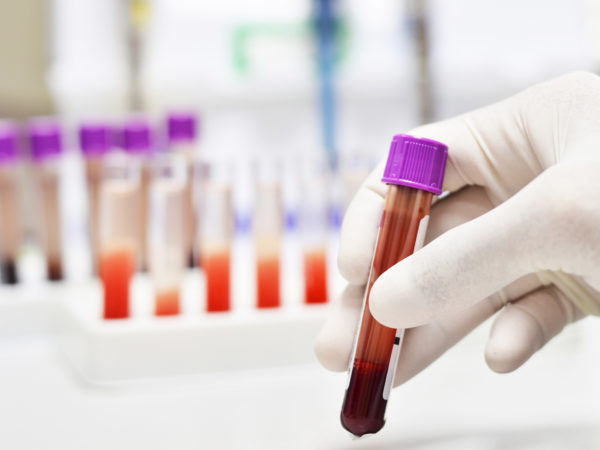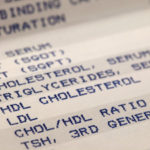HDL Cholesterol & LDL Cholesterol: What They Mean

Blood samples to measure cholesterol levels are drawn after you’ve fasted for nine to 12 hours. Results reveal total cholesterol as well as levels of LDL and HDL (the “bad” and “good” subtypes). Some doctors also order tests for LDL particle size and number.
The buildup of cholesterol on artery walls narrows the vessels, slowing or blocking the flow of blood. If a coronary artery – one supplying the heart – is completely blocked, the result is often a heart attack. Total cholesterol, HDL (high-density lipoprotein) and LDL (low-density lipoprotein) levels are influenced by heredity, diet, weight, exercise, age, gender, alcohol consumption, and stress. The older you get, the more likely your cholesterol will rise. Before menopause, women tend to have lower levels than men of the same age, but after menopause, women’s LDL levels often increase.
What Is HDL Cholesterol?
HDL picks up cholesterol from the blood and delivers it to cells that can use it or to the liver to be recycled or eliminated from the body. We’ve long believed that the higher your HDL, the lower your risk of heart disease. Studies have suggested that each increase of four milligrams per deciliter (mg/dL) of HDL in blood reduces the risk of adverse coronary events by 10 percent. A desirable level of HDL is 60 mg/dL or higher. Levels below 40 mg/dL for men and 50 mg/dL for women increase the risk. HDL levels of 60 mg/dL or above are classified as high and have been considered protective against heart disease.
The only caveat to this comes from Danish research published in 2017 linking very high HDL with increased risk of death from all causes, not just cardiovascular disease. Researchers from the University of Copenhagen tracked 116,508 men and women for an average of six years. During that period, 10,678 of these individuals died. The investigators reported that men with extremely high HDL levels – ranging from 97 to 115 – had a 36 percent increased risk of death. That risk doubled among those whose HDL exceeded 116. Women with HDL levels above 135 had a 68 percent increased risk. Extremely high HDL was rare: only 2.3 percent of the men had levels exceeding 97, and 0.3 percent of the women had HDL above 135.
Because this was an observational study, it doesn’t prove that extremely high HDL actually caused the deaths seen. And since the study included only white individuals of Danish descent, the findings might not apply to people elsewhere. Further research is needed to confirm the Danish findings.
How To Raise Your HDL Cholesterol
- Avoid trans-fatty acids: These heart-damaging fats reduce HDL and raise LDL. Trans-fats have been banned in the U.S. and should no longer be in foods sold in restaurants or grocery stores. Check labels and do not consume any foods that list “partially hydrogenated oil”(of any kind) as an ingredient.
- Exercise: Daily aerobic exercise can help increase HDL.
- Don’t smoke: Smoking is a major risk factor for heart disease; it can significantly lower HDL.
- Eat more fish: Choose cold-water fish such as wild Alaskan salmon, sardines, herring, mackerel and black cod. If that’s not possible, take two grams daily of a fish oil supplement that contains both essential omega-3 fatty acids, EPA (eicosapentaenoic acid) and DHA (docosahexaenoic acid). Look for a supplement derived from molecularly distilled fish oils – these are naturally high in both EPA and DHA and low in contaminants. Also choose a brand that has been independently tested and guaranteed to be free of heavy metals such as mercury and lead, and other environmental toxins including polychlorinated biphenyls, also known as PCBs.
- Eat almonds: Regular almond consumption seems to increase HDL according to a study from Penn State. Participants were put on a diet that included 43 grams of almonds (about a handful) for six weeks. The researchers reported that the diet improved HDL function by 6.4 percent among study participants of normal weight.
What is LDL Cholesterol?
LDL is known as “bad” cholesterol because it transports cholesterol from the liver throughout the body, potentially allowing it to be deposited in artery walls. A desirable level of LDL is less than 100 mg/dL. Levels between 139 and 150 mg/dL are considered borderline high, those between 160 to 189 mg/dL are viewed as high, while levels above 190 mg/dL are classed as very high.
How To Lower Your LDL & Reduce Risk Of Cardiovascular Disease
- Anti-inflammatory diet: One of the most effective strategies for lowering LDL cholesterol is adopting an anti-inflammatory diet. Its principal features are five servings of vegetables and two servings of fruit every day, whole grains instead of products made from flour, more fish and less meat, and olive oil as the main dietary fat. The anti-inflammatory diet has been shown to reduce heart disease and vascular disease by 30% or more.
- Regular exercise: As little as 30 minutes of brisk walking daily – can go a long way to keep your heart strong.
- Maintain a healthy weight: Lose weight if necessary.
- Daily meditation: This can reduce the risk of a heart attack by almost 50 percent.
- Relax: Emotional stress may prompt the body to release fat into the bloodstream, raising cholesterol levels. Counter stress by practicing daily breathing exercises and other stress-reduction techniques such as yoga, meditation, guided imagery or tai chi.
- Eat some nuts every day: Choose almonds, walnuts and cashews, all of which contain heart-healthy monounsaturated fat.
- Reduce the amount of sugar and flour in your diet:Recent evidence indicates that added sugar – in the form of table sugar (sucrose) or high-fructose corn syrup –probably is a greater contributor to heart disease than consumption of saturated fat.
- Use fresh garlic regularly: Garlic has been shown to lower cholesterol levels and blood pressure. Try to eat one or two raw or lightly cooked cloves a day.
- Drink green tea daily: The antioxidants it contains help lower cholesterol and prevent the LDL cholesterol in your blood from oxidizing.
- Take coenzyme Q10 (CoQ10): This powerful antioxidant benefits heart health by preventing the oxidation of LDL cholesterol and by invigorating the mitochondria in the heart cells (mitochondria are the energy factories in cells). CoQ10 may also help lower blood pressure.
- Eat plenty of soluble fiber: Beans and lentils, apples, citrus fruits, oats, barley, peas, carrots and freshly ground flax seed are all good sources of soluble fiber, which has a modest cholesterol-lowering effect.
- Substitute whole soy protein for animal protein: Soy protein in whole form, such as tofu, tempeh, soymilk, whole soybeans and roasted soy nuts has been shown to lower cholesterol levels. Choose certified organic products whenever possible.











